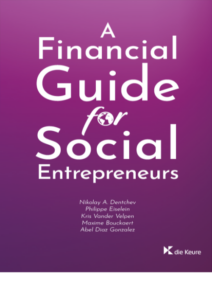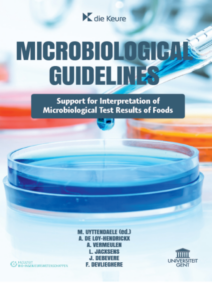| A Financial Guide for Social Entrepreneurs (e-book) E-book This book provides what it promises to the reader, i.e. A financial guide for social entrepreneurs. It departs from the challenges that social entrepreneurs face to fund their ventures. We discuss three main challenges in this context:
This book offers an overview of the different funding possibilities while presenting the main funding actors in Belgium as an illustration. Yet, we think that more is needed to survive the financial wilderness of social entrepreneurship. Therefore, we advise attention to a solid business model, supportive ecosystem, impact measurement and effective communication. The illustrative case studies and the presentation of ecosystem actors that can provide support to social entrepreneurs make this book a quite practical guide. All cases and ecosystem actors presented here come from the Belgian context, which is what we know best. We are confident that this Belgian view can inspire the international community as well. This book could be useful to social entrepreneurs, impact investors, universities, vocational training centers, corporates supporting social entrepreneurs, social impact incubators and accelerators, policymakers or everyone who wants to help a social enterprise in their journey. And please enjoy reading, our societies need more social entrepreneurship! 2020 Bouckaert Maxime, Dentchev Nikolay, ... | €29 | |
| Microbiological Guidelines (e-book) E-book Microbiological Guidelines: Support for Interpretation of Microbiological Test Results of Foods.
Food should be tasty, healthy, sustainable and preferably not too expensive. But food should also be safe and with sufficient guarantees on maintaining good quality aspects until the end-of-shelf life. The various actors in the food supply chain have an interest in verifying the expected quality and safety by means of microbiological analyses of food. Measurement brings knowledge and microbiological guidelines help in the decision-making process for judging the acceptability of food or food production processes. The present handbook provides microbiological guidelines and current applicable EU legal criteria (status 1.1.2018) for a wide range of food categories (dairy, meat, seafoods, plant-based foods, bakery products, composite foods, shelf-stable food, water) and subcategories therein, based upon the type of food processing and intrinsic characteristics of the foods. This book can be consulted to provide quick answers on the expected microbiological contamination of foodstuff. It can help in interpretation of test results in assessing good (hygienic) practices in the production of food, determining the shelf life and ensuring food safety. The handbook also presents definitions of the wide variety of foodstuffs available and some reflections on, in particular, food safety issues or the on-going debate for some food items in assessing microbial quality. Furthermore, dedicated chapters deal with basic information on the various microbial parameters useful in testing of foods, sampling is discussed, and the set-up of challenge testing as a tool to assess food safety is elaborated upon. 2018 De Loy Hendrickx Anja, Debevere Johan, ... | €95 |
Restez au courant des nouvelles publications, des promotions et des formations. S’abonner à la lettre d’information.


